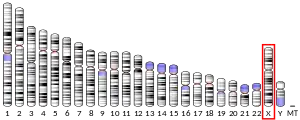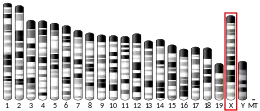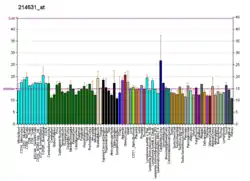ZBTB33
Transcriptional regulator Kaiso is a protein that in humans is encoded by the ZBTB33 gene.[5] This gene encodes a transcriptional regulator with bimodal DNA-binding specificity, which binds to methylated CGCG and also to the non-methylated consensus KAISO-binding site TCCTGCNA. The protein contains an N-terminal POZ/BTB domain and 3 C-terminal zinc finger motifs. It recruits the N-CoR repressor complex to promote histone deacetylation and the formation of repressive chromatin structures in target gene promoters. It may contribute to the repression of target genes of the Wnt signaling pathway, and may also activate transcription of a subset of target genes by the recruitment of catenin delta-2 (CTNND2). Its interaction with catenin delta-1 (CTNND1) inhibits binding to both methylated and non-methylated DNA. It also interacts directly with the nuclear import receptor Importin-α2 (also known as karyopherin alpha2 or RAG cohort 1), which may mediate nuclear import of this protein. Alternatively spliced transcript variants encoding the same protein have been identified.[6]
| ZBTB33 | |||||||||||||||||||||||||||||||||||||||||||||||||||
|---|---|---|---|---|---|---|---|---|---|---|---|---|---|---|---|---|---|---|---|---|---|---|---|---|---|---|---|---|---|---|---|---|---|---|---|---|---|---|---|---|---|---|---|---|---|---|---|---|---|---|---|
| |||||||||||||||||||||||||||||||||||||||||||||||||||
| Identifiers | |||||||||||||||||||||||||||||||||||||||||||||||||||
| Aliases | ZBTB33, ZNF-kaiso, ZNF348, zinc finger and BTB domain containing 33 | ||||||||||||||||||||||||||||||||||||||||||||||||||
| External IDs | OMIM: 300329 MGI: 1927290 HomoloGene: 4931 GeneCards: ZBTB33 | ||||||||||||||||||||||||||||||||||||||||||||||||||
| |||||||||||||||||||||||||||||||||||||||||||||||||||
| |||||||||||||||||||||||||||||||||||||||||||||||||||
| |||||||||||||||||||||||||||||||||||||||||||||||||||
| |||||||||||||||||||||||||||||||||||||||||||||||||||
| |||||||||||||||||||||||||||||||||||||||||||||||||||
| Wikidata | |||||||||||||||||||||||||||||||||||||||||||||||||||
| |||||||||||||||||||||||||||||||||||||||||||||||||||
NAMED by Dr.Juliet Daniel's, the KAISO gene was named after 'calypso' music popular in the Caribbeans, Trinidad & Tobago, e.t.c.
Interactions
ZBTB33 has been shown to interact with HDAC3,[7] Nuclear receptor co-repressor 1[7] and CTNND1.[8]
References
- GRCh38: Ensembl release 89: ENSG00000177485 - Ensembl, May 2017
- GRCm38: Ensembl release 89: ENSMUSG00000048047 - Ensembl, May 2017
- "Human PubMed Reference:". National Center for Biotechnology Information, U.S. National Library of Medicine.
- "Mouse PubMed Reference:". National Center for Biotechnology Information, U.S. National Library of Medicine.
- "Entrez Gene: ZBTB33 zinc finger and BTB domain containing 33".
- "ZBTB33 zinc finger and BTB domain containing 33 [Homo sapiens (human)] - Gene - NCBI". www.ncbi.nlm.nih.gov. Retrieved 2016-03-22.
- Yoon HG, Chan DW, Reynolds AB, Qin J, Wong J (Sep 2003). "N-CoR mediates DNA methylation-dependent repression through a methyl CpG binding protein Kaiso". Molecular Cell. 12 (3): 723–34. doi:10.1016/j.molcel.2003.08.008. PMID 14527417.
- Daniel JM, Reynolds AB (May 1999). "The catenin p120(ctn) interacts with Kaiso, a novel BTB/POZ domain zinc finger transcription factor". Molecular and Cellular Biology. 19 (5): 3614–23. doi:10.1128/mcb.19.5.3614. PMC 84161. PMID 10207085.
Further reading
- Daniel JM, Reynolds AB (May 1999). "The catenin p120(ctn) interacts with Kaiso, a novel BTB/POZ domain zinc finger transcription factor". Molecular and Cellular Biology. 19 (5): 3614–23. doi:10.1128/mcb.19.5.3614. PMC 84161. PMID 10207085.
- Hartley JL, Temple GF, Brasch MA (Nov 2000). "DNA cloning using in vitro site-specific recombination". Genome Research. 10 (11): 1788–95. doi:10.1101/gr.143000. PMC 310948. PMID 11076863.
- Wiemann S, Weil B, Wellenreuther R, Gassenhuber J, Glassl S, Ansorge W, Böcher M, Blöcker H, Bauersachs S, Blum H, Lauber J, Düsterhöft A, Beyer A, Köhrer K, Strack N, Mewes HW, Ottenwälder B, Obermaier B, Tampe J, Heubner D, Wambutt R, Korn B, Klein M, Poustka A (Mar 2001). "Toward a catalog of human genes and proteins: sequencing and analysis of 500 novel complete protein coding human cDNAs". Genome Research. 11 (3): 422–35. doi:10.1101/gr.GR1547R. PMC 311072. PMID 11230166.
- Prokhortchouk A, Hendrich B, Jørgensen H, Ruzov A, Wilm M, Georgiev G, Bird A, Prokhortchouk E (Jul 2001). "The p120 catenin partner Kaiso is a DNA methylation-dependent transcriptional repressor". Genes & Development. 15 (13): 1613–8. doi:10.1101/gad.198501. PMC 312733. PMID 11445535.
- Daniel JM, Ireton RC, Reynolds AB (Jun 2001). "Monoclonal antibodies to Kaiso: a novel transcription factor and p120ctn-binding protein". Hybridoma. 20 (3): 159–66. doi:10.1089/027245701750293484. PMID 11461664.
- Yoon HG, Chan DW, Reynolds AB, Qin J, Wong J (Sep 2003). "N-CoR mediates DNA methylation-dependent repression through a methyl CpG binding protein Kaiso". Molecular Cell. 12 (3): 723–34. doi:10.1016/j.molcel.2003.08.008. PMID 14527417.
- Kondapalli J, Flozak AS, Albuquerque ML (Mar 2004). "Laminar shear stress differentially modulates gene expression of p120 catenin, Kaiso transcription factor, and vascular endothelial cadherin in human coronary artery endothelial cells". The Journal of Biological Chemistry. 279 (12): 11417–24. doi:10.1074/jbc.M306057200. PMID 14699141.
- Wiemann S, Arlt D, Huber W, Wellenreuther R, Schleeger S, Mehrle A, Bechtel S, Sauermann M, Korf U, Pepperkok R, Sültmann H, Poustka A (Oct 2004). "From ORFeome to biology: a functional genomics pipeline". Genome Research. 14 (10B): 2136–44. doi:10.1101/gr.2576704. PMC 528930. PMID 15489336.
- Kim SW, Park JI, Spring CM, Sater AK, Ji H, Otchere AA, Daniel JM, McCrea PD (Dec 2004). "Non-canonical Wnt signals are modulated by the Kaiso transcriptional repressor and p120-catenin". Nature Cell Biology. 6 (12): 1212–20. doi:10.1038/ncb1191. PMID 15543138. S2CID 19404686.
- Ruzov A, Dunican DS, Prokhortchouk A, Pennings S, Stancheva I, Prokhortchouk E, Meehan RR (Dec 2004). "Kaiso is a genome-wide repressor of transcription that is essential for amphibian development". Development. 131 (24): 6185–94. doi:10.1242/dev.01549. PMID 15548582.
- Kelly KF, Otchere AA, Graham M, Daniel JM (Dec 2004). "Nuclear import of the BTB/POZ transcriptional regulator Kaiso". Journal of Cell Science. 117 (Pt 25): 6143–52. doi:10.1242/jcs.01541. PMID 15564377.
- Rush J, Moritz A, Lee KA, Guo A, Goss VL, Spek EJ, Zhang H, Zha XM, Polakiewicz RD, Comb MJ (Jan 2005). "Immunoaffinity profiling of tyrosine phosphorylation in cancer cells". Nature Biotechnology. 23 (1): 94–101. doi:10.1038/nbt1046. PMID 15592455. S2CID 7200157.
- Soubry A, van Hengel J, Parthoens E, Colpaert C, Van Marck E, Waltregny D, Reynolds AB, van Roy F (Mar 2005). "Expression and nuclear location of the transcriptional repressor Kaiso is regulated by the tumor microenvironment". Cancer Research. 65 (6): 2224–33. doi:10.1158/0008-5472.CAN-04-2020. PMID 15781635.
- Spring CM, Kelly KF, O'Kelly I, Graham M, Crawford HC, Daniel JM (May 2005). "The catenin p120ctn inhibits Kaiso-mediated transcriptional repression of the beta-catenin/TCF target gene matrilysin". Experimental Cell Research. 305 (2): 253–65. doi:10.1016/j.yexcr.2005.01.007. PMID 15817151.
- Arányi T, Faucheux BA, Khalfallah O, Vodjdani G, Biguet NF, Mallet J, Meloni R (Jul 2005). "The tissue-specific methylation of the human tyrosine hydroxylase gene reveals new regulatory elements in the first exon". Journal of Neurochemistry. 94 (1): 129–39. doi:10.1111/j.1471-4159.2005.03173.x. PMID 15953356.
- Defossez PA, Kelly KF, Filion GJ, Pérez-Torrado R, Magdinier F, Menoni H, Nordgaard CL, Daniel JM, Gilson E (Dec 2005). "The human enhancer blocker CTC-binding factor interacts with the transcription factor Kaiso". The Journal of Biological Chemistry. 280 (52): 43017–23. doi:10.1074/jbc.M510802200. PMID 16230345.
External links
- ZBTB33+protein,+human at the U.S. National Library of Medicine Medical Subject Headings (MeSH)
- FactorBook ZBTB33
- ZBTB33 human gene location in the UCSC Genome Browser.
- ZBTB33 human gene details in the UCSC Genome Browser.
This article incorporates text from the United States National Library of Medicine, which is in the public domain.




